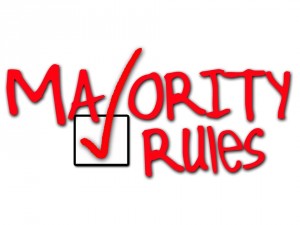The coming Independent majority

As more and more American voters join the ranks of the unaffiliated, it is likely only a matter of time before Independents constitute an outright majority nationwide. Indeed, there are already more Independents in the United States than there are either Democrats or Republicans.
A Gallup Poll survey published last week found that Independent identification is now at a record high, while affiliation with the Democratic and Republican parties remains stagnant or continues to decline. The most recent numbers represent the polling outfit's annual average of party identification for 2011, based on over 20,000 interviews in twenty different polls conducted over the last year. Gallup found that 40% of Americans identify themselves as Independents, compared with 31% who identify themselves as Democrats and just 27% who openly affiliate with the Republican party.
The previous record high for Independent identification was 39%, found in 2007 and 1995. Between 1951 and 1988, Independent identification hovered in the low 30% range across all of Gallup's surveys. The 40% mark thus represents a 60 year high. The increase in Independent identification from 38% to 40% between 2010 and 2011 appears to have been the result of defections from the GOP, which lost 2% support over the same period. Democratic party identification held steady at 31%.
In a separate report, also published last week, Gallup released its annual average of ideological identification for 2011. Though the percentage of conservatives among Independents has risen rather significantly over the last four years, moderates remain the largest block of self-identified Independent voters. 41% of Independents identify themselves as political moderates, 36% are either conservative (28%) or very conservative (8%) and 19% are liberal (14%) or very liberal (5%). In 2008, 30% of Independents identified themselves as conservative or very conservative.
At the same time, the percentage of moderates identifying themselves as Republicans or Democrats has decreased significantly over the last ten years. In 2001, 31% of Republicans were moderates compared with just 23% in 2011. Over the same period, the percentage of moderates among self-identified Democrats also decreased, though not quite as drastically. In 2001, 44% of Democrats identified themselves as moderates, while only 38% of Democrats identified themselves as moderates in 2011.
Despite their professed independence, most Independent voters nonetheless tend to act like weak partisans of the major parties in the voting booth, consistently siding with either the Democrats or Republicans in election after election. When one adds the base levels of support for the Republican and Democratic parties together with Independents who lean toward one or the other, it turns out that neither has a competitive advantage. As Gallup reports:
“The parties end up tied. In 2011, 45% of Americans identified as Republicans or leaned to the Republican Party and 45% identified as Democrats or leaned Democratic.”
As Americans continue their exodus from the major parties, an obvious question arises: when will self-described Independents finally begin to cast their ballots for Independents rather than continue to provide political cover for the seemingly failed policies of the two-party state?



